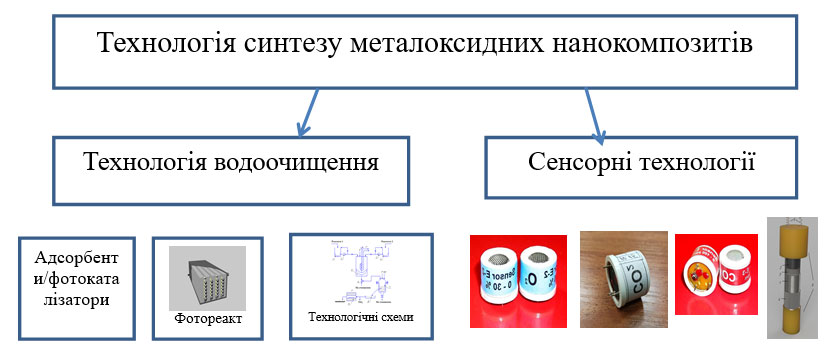Sensoric equipment for environmental monitoring and technological principles of water purification based on the novel nanodisperse adsorption materials
Technological bases for obtaining the latest adsorption nanomaterials: magnetically controlled sorbents, nanocomposites with catalytic and photocatalytic properties (TiO2, ZrO2, Ag2O, SnO2, MnO2, RuO2, Pt, Au, Ag, Co2O3) • Co3O. The mechanism and technological bases of the offered nanomaterials' interaction with substances - pollutants against the background of their multi-component mixes are revealed. Experimental samples of chemical sensors for determination of dissolved oxygen in water, pollutant gases, and gases that are products of their technological destruction using new nanodisperse materials with high chemical affinity (CO and CO2 sensors for air); developed and approved their technical descriptions; the technological regulations are made and the technology of manufacturing of sensitive elements of sensors are registered.
An online monitoring method based on a non-standard system for determining the oxygen concentration in the aquatic environment as one of the main agents of organic matter disposal technologies in wastewater, as well as to increase the stability of the gas analyzer measuring system in the presence of a wide range of pollutants capable of electrodes/catalysts of the created sensors. The resource efficiency and environmental friendliness of the wastewater conditioning scheme to the requirements of their discharge or reuse in the industry are substantiated. A set of technological principles of wastewater treatment and control of their safety and efficiency with the use of new adsorption nanostructured materials has been created.
The research complex is interdisciplinary and has a novelty of an integrated approach to the use of newly developed nanomaterials both as sorbents in wastewater treatment technology and as sensitive layers of electrodes in sensory technologies from existing ones, which offer only some technical solutions and only one direction.

| Attachment | Size |
|---|---|
| 248.39 KB |




